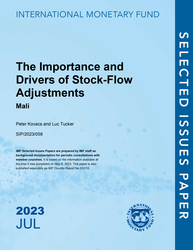
The Importance and Drivers of Stock-Flow Adjustments in Mali
Stock-flow adjustments—extra-budgetary and below-the-line operations that do not reflect standard spending and revenue—have added 9 percentage points to the debt-to-GDP ratio in Mali over the past decade.
READ MORE...
Volume/Issue:
Volume 2023
Issue 058
Publication date: July 2023
ISBN: 9798400248764
$15.00
Add to Cart by clicking price of the language and format you'd like to purchase
Available Languages and Formats
| English |
Prices in red indicate formats that are not yet available but are forthcoming.
Topics covered in this book
This title contains information about the following subjects.
Click on a subject if you would like to see other titles with the same subjects.
Exports and Imports , Money and Monetary Policy , Public Finance , International - Economics , Inflation , monetary policy , WAEMU , monetary unions , policy rates , inflation forecasts , stock-flow adjustment , fiscal policy decision-making , debt-to-GDP ratio in Mali , debt database , headline deficit , Government debt management , Debt sustainability analysis , Sub-Saharan Africa , Global
Summary
Stock-flow adjustments—extra-budgetary and below-the-line operations that do not reflect standard spending and revenue—have added 9 percentage points to the debt-to-GDP ratio in Mali over the past decade. That is just under a third of the total increase in public debt over that period. Despite their importance, there is little understanding of the causes of stock-flow adjustments. A number of actions could be taken to either reduce the occurrence of stock-flow adjustments or to increase transparency and monitoring which would assist fiscal policy decision-making.
Copyright © 2010 - 2026
Powered by:
AIDC



